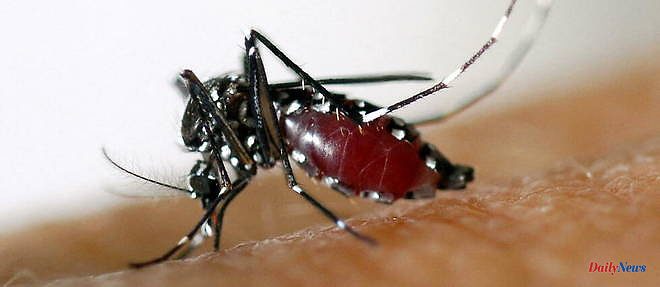The tiger mosquito will be under enhanced surveillance in France from next week, while over the years the presence of this insect, vector of nuisance and disease, is spreading inexorably over the territory. From May 1 to November 30, which corresponds to its main period of activity, the health authorities will scrutinize the presence of Aedes albopictus – its scientific name –, multiply awareness messages and trigger possible mosquito control operations.
Indeed, last summer, the tiger mosquito, recognizable thanks to its black and white stripes, left a bad memory. As of January 1, 2023, it had colonized 71 departments, a number that has been constantly increasing since its installation in France in 2004. And the insect, which bites more in the morning and in the evening, has been the cause of 65 "cases natives" of dengue, concentrated in the south of France: the term refers to patients who have not traveled to areas where the virus circulates widely such as the West Indies, but have been bitten by a mosquito that has infected itself in contact with an infected traveler.
"65 cases may not seem like a lot, but it shows a dynamic, it's a signal for the future," warns Marie-Claire Paty, vector-borne disease surveillance coordinator at Public Health France. In fact, since 2010, the number of metropolitan departments colonized by the tiger mosquito has multiplied by ten. "We are convinced that this is a risk that will intensify," insists Ms. Paty.
This is also the message conveyed by the Health Risk Watch and Anticipation Committee (Covars), the former scientific council, in a recent opinion. We can expect, in the coming years, an increase in cases of dengue fever, Zika and chikungunya, diseases transmitted by "vector" mosquitoes now widely established on the national territory, he warned. Viral diseases that "could become public health problems".
If, in mainland France, it has not been observed to date in a serious form, complications are always possible, which can lead to resuscitation, even death, recalls Marie-Claire Paty. In Île-de-France, it is now definitively established in around a hundred municipalities.
"Its expansion is inevitable," says entomologist Didier Fontenille. "It's an urban insect, which travels in cars and lays its eggs in collections of water" left by people - breeding places - such as pots, saucers, water pans. "He loves human blood, which there's no shortage of in town," he continues.
To make matters worse, global warming has indirect effects on mosquito growth: the warmer it is, the shorter the mosquito's development cycle. The rate of multiplication of the virus inside the insect is also increased under the effect of temperature. "So the hotter it is, the faster it can transmit an infection," says Anna-Bella Failloux, a specialist in mosquito-related diseases at the Institut Pasteur.
However, its expansion remains essentially favored by travel and human behavior. The health authorities thus fear the forthcoming organization of major international sporting events in mainland France – in particular the 2024 Olympic Games – which will give rise to major movements of populations from all over the world.
"If in the overseas territories the tiger mosquito transmits many viruses, it remains for the moment in mainland France an essentially harmful insect. But that could change in the years to come,” advises Didier Fontenille. To limit the risks, "the first thing to do is to make life difficult for him", advises this research director at the Research Institute for Development (IRD) in Montpellier. "Overseas, the mosquito is already part of everyday life. In France, we will now have to learn to live with it, ”sums up Anna-Bella Failloux.
Eliminate all places where water can stagnate, empty containers, cover reservoirs and swimming pools when they are not in use… here are just a few things to do, both by individuals and territorial agents. Some repellents can also be useful, but not all are optimally effective against the tiger mosquito.












